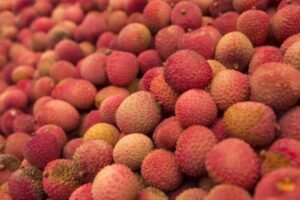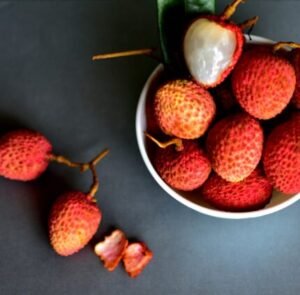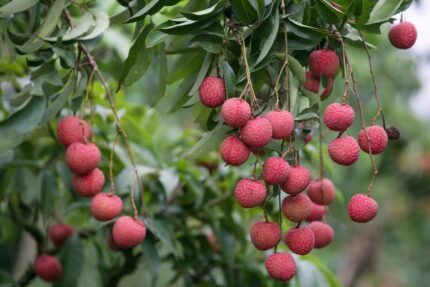Medically reviewed by Dr. Ramesh Gaddam, M.D. — Written by Sumalatha, D.N.H.E
Litchi, also known as lychee or lichee, is a tropical fruit that is native to Southeast Asia, specifically China.
It is a small, round fruit with a rough, reddish-pink to brown outer skin that is inedible.
The flesh of the litchi is juicy, sweet, and translucent, with a fragrant, floral flavor. It surrounds a single large seed in the center.
1. Lychee Nutrition
Nutritional profile of Litchi Litchi (per 100 grams)
| Nutrient | Amount per 100 grams |
|---|---|
| Calories | 66 calories |
| Carbohydrates | 16.5 grams |
| Sugars | 15.2 grams |
| Dietary Fiber | 1.3 grams |
| Protein | 0.8 grams |
| Fat | < 0.4 grams |
| Vitamin C | 136% of Daily Value |
| Potassium | 171 milligrams |
| Copper | 0.1 milligrams |
| Vitamin B-complex | Small amounts |
| Antioxidants | Various |
2. Health Benefits
Litchi, also known as lychee, is a delicious tropical fruit that not only tastes great but also offers numerous health benefits:

Rich in Vitamin C:
Litchi is an excellent source of vitamin C, which is known for its antioxidant properties.
Vitamin C supports the immune system, aids in wound healing, and can help protect cells from damage by free radicals.
Antioxidant Properties:
Litchi contains various antioxidants, including polyphenols and flavonoids, which may help reduce oxidative stress and lower the risk of chronic diseases.
Heart Health:
The fiber and potassium in litchi can contribute to heart health.
Potassium helps regulate blood pressure, and the fiber may help lower cholesterol levels and reduce the risk of cardiovascular disease.
Digestive Health:
Litchi contains dietary fiber, which can aid in digestion and promote regular bowel movements. It may also help prevent constipation.
Hydration:
Litchi has a high water content, which can help with hydration. Staying hydrated is essential for overall well-being.
Skin Health:
The vitamin C and antioxidants in litchi may support healthy skin by promoting collagen production and protecting against skin damage caused by UV radiation and pollution.
Weight Management:
Litchi is a low-calorie, low-fat fruit, making it a suitable option for those looking to manage their weight while satisfying their sweet cravings.
Immune Support:
The vitamin C in litchi can help strengthen the immune system, making your body more resilient against infections and illnesses.
Bone Health:
Litchi contains some minerals like copper, which is important for maintaining healthy bones.
Anti-Inflammatory Potential:
Some compounds in litchi may have anti-inflammatory properties, which could be beneficial in managing inflammatory conditions.
3. Lychee Side Effects

Litchi, like most foods, is generally safe to consume in moderate amounts for the majority of people.
However, there are some potential side effects and considerations to be aware of:
Hypoglycemia (Low Blood Sugar):
Litchis are high in natural sugars, particularly fructose.
Excessive consumption of litchis, especially by individuals with diabetes or poor blood sugar control, can lead to a rapid increase in blood sugar levels, followed by a sharp drop, resulting in hypoglycemia.
This is of particular concern in the case of young children in certain regions where litchi consumption has been linked to hypoglycemic encephalopathy.
Allergies:
Some individuals may be allergic to litchi.
Allergic reactions can range from mild skin rashes and itching to more severe symptoms such as swelling, difficulty breathing, or anaphylaxis.
If you have a known allergy to other fruits or are uncertain about your reaction to litchi, exercise caution when trying it for the first time.
Gastrointestinal Upset:
Eating litchis in excessive quantities may lead to digestive discomfort, including diarrhea and stomach cramps, due to their relatively high sugar content and fiber.
Dental Health:
Litchis, like many fruits, contain natural sugars that can contribute to tooth decay and cavities if consumed in excess.
It’s advisable to practice good dental hygiene after consuming litchis.
Weight Gain:
While litchis are low in calories, they are not calorie-free.
Overconsumption of calorie-rich foods, including litchis, can lead to weight gain if not balanced with a healthy diet and regular physical activity.
Oxalates:
Litchis contain oxalates, which can contribute to the formation of kidney stones in susceptible individuals.
If you are prone to kidney stones or have a history of kidney stones, you may need to moderate your intake of high-oxalate foods, including litchis.
Latex-Fruit Syndrome:
Some individuals with latex allergies may experience cross-reactivity with certain fruits, including litchis.
If you have a latex allergy, be cautious when trying litchis for the first time, as you may experience allergic symptoms.
4. Lychee Uses

Litchi, also known as lychee, can be used in various ways due to its delicious flavor and nutritional benefits:
Fresh Consumption:
Litchis are often enjoyed fresh, peeled, and eaten as a delicious and refreshing fruit.
The sweet and juicy flesh is a popular snack in many parts of the world.
Desserts:
Litchis are used in a wide range of desserts, including fruit salads, ice creams, sorbets, and custards. They can add a sweet and fragrant flavor to various sweet treats.
Smoothies:
Litchis are a great addition to fruit smoothies, providing a natural sweetness and a unique tropical flavor.
Cocktails:
Litchis are often used in cocktails, such as lychee martinis and mojitos. Lychee syrup or liqueur is used to add a sweet, floral note to these beverages.
Preserves and Jams:
Litchis can be used to make jams, jellies, and fruit preserves. Their natural sweetness and aromatic flavor make them an excellent choice for preserving.
Asian Cuisine:
Litchis are commonly used in various Asian dishes, both in sweet and savory preparations. They can be included in salads, stir-fries, and sauces, adding a unique flavor and texture.
Litchi Juice:
Litchi juice is a popular beverage in some regions. It can be consumed as a refreshing drink or used as a base for cocktails and mocktails.
Medicinal Uses:
In traditional Chinese medicine, litchi has been used for its potential medicinal properties. It is believed to have benefits for digestion and to help alleviate coughs and throat discomfort.
Skin and Hair Care:
Litchi extract is sometimes used in cosmetics and skincare products due to its antioxidant properties, which can help protect the skin from damage and premature aging. It may also be used in hair care products for its potential nourishing effects.
Litchi Tea:
Litchi tea can be made by steeping dried litchi fruits in hot water. This tea is often consumed for its pleasant flavor and potential health benefits.
Litchi Syrup:
Litchi syrup is used as a sweetening agent in various recipes, especially in cocktails and beverages.
Gifts and Decorations:
Litchis are sometimes used as decorative elements in fruit baskets and arrangements, making them a visually appealing gift option.
5. Lychee benefits for Male

Litchi, like many fruits, offers various potential health benefits for both men and women due to its nutritional content and natural compounds.
Here are some of the potential benefits of litchi for men:
Rich in Vitamin C:
Litchi is an excellent source of vitamin C, which is important for overall health.
Vitamin C is known for its antioxidant properties, which can help protect the body’s cells from damage by free radicals.
Heart Health:
The antioxidants and dietary fiber in litchi can contribute to heart health by reducing the risk of cardiovascular diseases and supporting cholesterol management.
Immune Support:
Vitamin C in litchi helps strengthen the immune system, making the body more resilient against infections and illnesses.
Skin Health:
The vitamin C and antioxidants in litchi may support healthy skin by promoting collagen production and protecting against skin damage caused by UV radiation and pollution.
Hydration:
Litchi has a high water content, which can help with overall hydration, important for overall health.
Anti-Inflammatory Potential:
Some compounds in litchi may have anti-inflammatory properties, which could be beneficial in managing inflammatory conditions that can affect men.
Summary:
It’s important to consume litchi as part of a balanced diet, along with a variety of other fruits and vegetables.
Litchi can be included as part of a healthy diet that supports overall well-being.
If you have specific health concerns or conditions, it’s advisable to consult with a healthcare professional or a registered dietitian for personalized dietary recommendations.
6. Lychee benefits for Skin

Litchi, also known as lychee, offers several potential benefits for skin health due to its nutritional content and the presence of natural compounds with antioxidant properties.
Here are some of the skin benefits associated with litchi:
Rich in Vitamin C:
Litchi is an excellent source of vitamin C, a powerful antioxidant.
Vitamin C is essential for collagen production, which helps maintain skin’s firmness and elasticity.
It also supports the repair of damaged skin cells and aids in wound healing.
Antioxidant Protection:
Litchi contains various antioxidants, including polyphenols and flavonoids.
These antioxidants help protect the skin from damage caused by free radicals, environmental factors, and UV radiation, which can contribute to premature aging and skin issues.
Hydration:
Litchi has a high water content, which helps keep the skin hydrated.
Proper hydration is important for maintaining the skin’s natural moisture and preventing dryness and flakiness.
Anti-Aging:
The antioxidants in litchi can help reduce the appearance of fine lines, wrinkles, and other signs of aging.
They combat oxidative stress and promote healthy, youthful-looking skin.
Radiant Complexion:
Regular consumption of litchi may contribute to a brighter and more radiant complexion, thanks to the antioxidants and nutrients it provides.
Skin Repair:
Vitamin C in litchi supports the repair of damaged skin cells and can help with the healing of wounds or blemishes.
Sun Protection:
While litchi is not a replacement for sunscreen, the antioxidants in litchi can provide some level of protection against UV damage. However, always use sunscreen when exposed to the sun.
Skin Health:
The overall nutritional content of litchi, including vitamins, minerals, and water, can help maintain the health and vitality of your skin.
Summary:
To enjoy the skin benefits of litchi, you can include it as part of a balanced diet, consume it fresh, make litchi smoothies, or even apply litchi-based skincare products that contain litchi extract.
As with any dietary or skincare regimen, individual results may vary, and it’s essential to maintain a consistent and comprehensive skincare routine for optimal skin health.
7. Lychee benefits for Hair

Litchi, also known as lychee, offers several potential benefits for hair health, primarily due to its nutritional content and the presence of natural compounds with antioxidant properties.
Here are some of the potential benefits of litchi for hair:
Rich in Vitamin C:
Litchi is an excellent source of vitamin C, which is essential for the production of collagen, a protein that helps strengthen hair strands and promote hair growth.
Collagen also contributes to maintaining the health of the hair and scalp.
Antioxidant Protection:
Litchi contains various antioxidants, including polyphenols and flavonoids.
These antioxidants help protect hair follicles and the scalp from oxidative stress, which can lead to hair damage and loss.
Hair Growth:
The presence of antioxidants in litchi can aid in promoting healthy hair growth by maintaining the overall health of hair follicles and preventing damage.
Reducing Hair Loss:
Antioxidants can help reduce hair loss by protecting hair follicles from damage and supporting the hair growth cycle.
Scalp Health:
The antioxidants in litchi contribute to a healthy scalp by reducing oxidative stress, promoting blood circulation, and preventing dandruff and other scalp issues.
Hydration:
Litchi has a high water content, which can help maintain the moisture balance of the hair and scalp, preventing dryness and brittle hair.
Shiny Hair:
Regular consumption of litchi may contribute to shinier and healthier-looking hair, thanks to the antioxidants and nutrients it provides.
Summary:
To enjoy the potential benefits of litchi for hair, you can include it as part of a balanced diet, consume it fresh, make litchi smoothies, or even use litchi-based hair care products that contain litchi extract.
As with any dietary or hair care regimen, individual results may vary, and it’s essential to maintain a consistent and comprehensive hair care routine for optimal hair health.
8. Lychee benefits for Weight Loss
Litchi, also known as lychee, can be a part of a weight loss-friendly diet due to its nutritional characteristics and low calorie content.
While litchi itself is not a “miracle” weight loss food, it can be a healthy addition to your diet for several reasons:
Low in Calories:
Litchi is relatively low in calories, making it a suitable snack or addition to your meals when you’re trying to manage your weight.
High Water Content:
Litchi has a high water content, which can help increase feelings of fullness and reduce the overall calorie intake during a meal.
Fiber:
Litchi contains dietary fiber, which also contributes to a feeling of fullness and can help control your appetite.
Low in Fat:
Litchi is naturally low in fat, making it a healthy option for those who are watching their fat intake.
Natural Sugars:
While litchi contains natural sugars, they are not typically a concern for weight management when consumed in moderation, as they provide sweetness without added sugars.
Tips for adding to Weight Loss Diet:
While litchi is low in calories, portion control is key. Overeating any food, even low-calorie options, can contribute to weight gain.
Ensure you have a balanced and varied diet that includes a mix of fruits, vegetables, lean proteins, and whole grains.
Pairing a healthy diet with regular physical activity is essential for achieving and maintaining a healthy weight.
If you have specific dietary goals or medical conditions, it’s a good idea to consult with a healthcare provider or a registered dietitian for personalized weight management recommendations.
Litchi can be a refreshing and healthy part of your diet, but it should be consumed in moderation as part of an overall balanced and calorie-controlled diet to support weight loss goals.
9. Lychee for Diabetes

Litchi, like many fruits, contains natural sugars, primarily fructose. For people with diabetes, it’s important to be mindful of their carbohydrate and sugar intake, as it can affect blood sugar levels.
Here are some considerations regarding litchi and diabetes:
Glycemic Index:
Litchi has a moderate glycemic index (GI), which means it can cause a gradual but noticeable increase in blood sugar levels when consumed.
However, the GI can vary based on factors such as ripeness and variety.
Portion Control:
If you have diabetes, you can still enjoy litchi in moderation.
Keep portion sizes in check, as consuming a large quantity of litchi at once can cause a rapid spike in blood sugar levels.
Fiber Content:
Litchi does contain dietary fiber, which can help slow the absorption of sugars, potentially stabilizing blood sugar levels.
However, the fiber content is relatively low compared to some other fruits.
Natural Sugars:
Litchi’s sugar content primarily consists of natural sugars.
While natural sugars are generally considered healthier than added sugars, they can still impact blood sugar levels.
Balance and Monitoring:
It’s essential for individuals with diabetes to balance their carbohydrate intake and monitor their blood sugar levels regularly.
If you choose to include litchi in your diet, be mindful of how it affects your individual blood sugar response.
Consult Your Healthcare Provider:
The impact of litchi on blood sugar can vary from person to person.
It’s a good idea to consult with your healthcare provider or a registered dietitian for personalized dietary recommendations, including the incorporation of litchi into your meal plan.
Summary:
In summary, litchi can be consumed in moderation by individuals with diabetes, but portion control and regular blood sugar monitoring are important.
It’s best to enjoy litchi as part of a well-balanced diet and to consult with a healthcare professional to determine how it fits into your individual dietary plan
Frequently Asked Questions (FAQs)
People searched questions frequently related to Lychee is:
Is Lychee good for Health
Litchi, also known as lychee, can be a healthy addition to your diet when consumed in moderation.
It offers several potential health benefits, primarily due to its nutritional content and natural compounds.
Please refer to the health benefits of litchi (lichi) listed above.
How to eat litchi
To eat litchi, follow these steps:
Peel:
Start by carefully peeling away the outer skin of the litchi.
The skin is typically reddish-pink to brown and is inedible.
You can use your fingers or a knife to gently remove the skin.
Deseed:
After peeling, you’ll find the fleshy part surrounding the seed.
To access the edible flesh, you’ll need to remove the seed.
This can be done by either biting into the fruit to separate the flesh from the seed (common in some cultures), or you can use your fingers or a small knife to carefully pop out the seed.
Edible Flesh:
Once the seed is removed, you can enjoy the sweet, translucent, and juicy flesh of the litchi.
This is the most desirable and delicious part of the fruit.
Lychee grows in which season
Litchi is typically in season during the late spring and early summer months, depending on the region. The exact timing can vary based on the climate and location of cultivation.
What is lichi called in English?
In English, litchi is spelled as “lychee.”
Does litchi increase blood sugar?
Regarding blood sugar, litchi contains natural sugars, primarily fructose.
For people with diabetes, it’s important to be mindful of their carbohydrate and sugar intake, as it can affect blood sugar levels.
Litchi, like other fruits, can cause a gradual but noticeable increase in blood sugar levels when consumed.
However, the impact can vary from person to person. It’s best to enjoy litchi in moderation and to monitor your individual blood sugar response.
Consult with a healthcare provider or a registered dietitian for personalized dietary recommendations, including the incorporation of litchi into your meal plan.
How many litchi should I eat in a day?
The number of litchis you should eat in a day can vary based on your individual dietary needs and preferences. Litchi is a nutritious fruit, but it does contain natural sugars, primarily fructose.
If you have no specific dietary restrictions, a few litchis (e.g., 4-6) can be a reasonable serving as a snack or part of a meal. It’s essential to consume them in moderation as part of a balanced diet.
If you have diabetes or other health conditions, it’s best to consult with a healthcare provider or a registered dietitian for personalized recommendations regarding the quantity of litchis that’s appropriate for you.
Does Lichi contain sugar?
Yes, litchi contains natural sugars. The sugar in litchi primarily consists of fructose, which is a natural fruit sugar.
How much sugar is in lychee?
The sugar content in lychee can vary based on the size and ripeness of the fruit.
On average, a 100-gram serving of fresh lychee contains approximately 9-14 grams of sugar.
Keep in mind that the sugar content can vary, so it’s a good idea to check the nutrition label or use a nutritional database for more precise information.
Can I eat Lychee at night?
You can eat litchi at night, just like you can enjoy it at any other time of the day.
Litchi is a healthy fruit, and it can be part of your evening snack or dessert.
However, if you have digestive discomfort when consuming litchi late at night, you might want to avoid it close to bedtime.
Can we drink water after eating litchi?
It is generally safe to drink water after eating litchi.
Water can help with digestion and hydration.
However, consuming too much water immediately after eating may dilute digestive juices, so it’s a good practice to wait a bit before drinking excessive amounts of water.
Is Lychee hot for body?
In some traditional medicine systems, litchi is considered a “hot” or “warming” food, meaning it is believed to increase body heat.
However, the concept of “hot” or “cold” foods in traditional medicine varies from one culture to another and may not have a scientific basis.
For most people, consuming litchi in moderation as part of a balanced diet is not likely to cause any significant change in body temperature.
If you have concerns about body heat or any specific health conditions, it’s advisable to consult with a healthcare professional or a registered dietitian for personalized dietary guidance.
Does lychee cause gas?
Lychee can potentially cause gas or digestive discomfort in some individuals, especially if consumed in excessive quantities.
This may be due to the natural sugars and fiber content in lychee.
It’s a good idea to enjoy lychee in moderation and observe how your body responds to it.
Is lychee good for skin?
Lychee is considered good for the skin due to its high vitamin C content and antioxidant properties.
Vitamin C promotes collagen production, which is important for maintaining healthy and youthful skin.
Antioxidants help protect the skin from damage caused by free radicals, which can contribute to premature aging.
Including lychee as part of a balanced diet can contribute to skin health.
Can I eat lychee every day?
You can eat lychee every day if you enjoy it and it’s part of a varied and balanced diet. Just be mindful of your overall fruit consumption and dietary needs, especially if you have specific health conditions.
Which is better mango or lychee?
Whether mango or lychee is “better” depends on individual preferences and dietary goals. Both fruits have their own unique flavors and nutritional benefits.
Mangoes are a good source of vitamin A and vitamin C, while lychee is rich in vitamin C and antioxidants. It’s advisable to include a variety of fruits in your diet to maximize nutritional diversity.
litchi lichi seeds
Can we eat litchi seeds?
Litchi seeds are not typically consumed because they are hard and inedible. The edible part of the litchi fruit is the flesh that surrounds the seed. The seeds should be removed before consuming the fruit.
Can we drink milk after eating litchi?
You can drink milk after eating litchi, and it’s generally safe to do so. Milk can help soothe the palate if the litchi is particularly sweet or if you simply enjoy the combination. There are no known adverse effects of consuming milk and litchi together.
How to eat litchi safely?
To eat litchi safely:
Wash the litchis thoroughly to remove any dirt or pesticides from the skin.
Carefully peel the litchi to access the edible flesh.
Remove the seed or pit from the litchi, as it is not edible.
Enjoy the sweet and juicy flesh of the litchi.
When should I eat litchi?
Litchis can be eaten at any time of day. They make a great snack, addition to fruit salads, or dessert.
You can eat them fresh, add them to various recipes, or enjoy litchi juice.
The best time to eat litchi is when it’s in season and at its ripest for the best flavor and sweetness.
Also Read:
7 Great Benefits of Elephant Foot Yam (Suran)
Honeydew Melon: Nutrition, Side Effects, (15 Super Benefits)
Medically reviewed by Dr. Ramesh Gaddam, M.D.

General Physician, Diabetologist, and Critical Care Specialist.
Discover more from Health Build-Up
Subscribe to get the latest posts sent to your email.


1 thought on “7 Red Lychee (Litchi) Health Benefits for Hair, Skin, Weight”
Comments are closed.